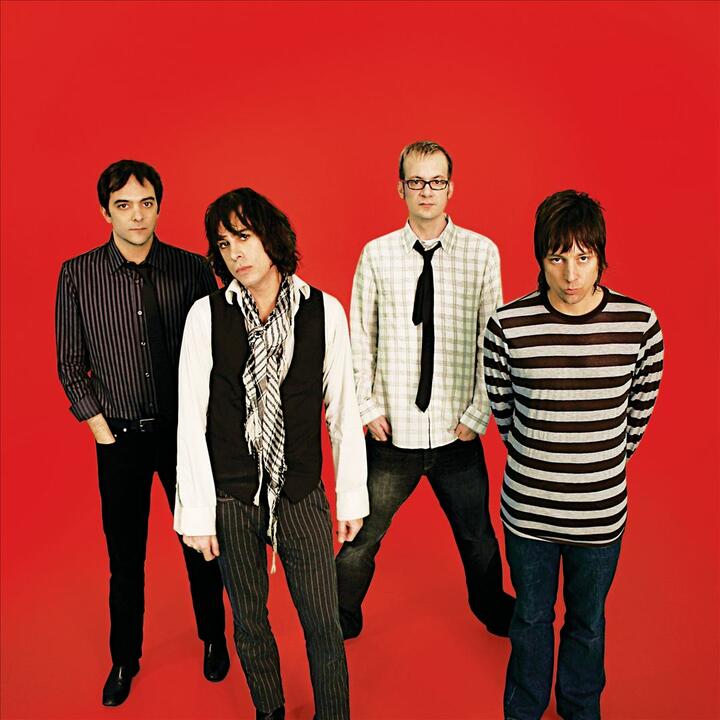The New York Observer: January 1997
Fountains of Wayne Play Pop To Ward Off Grunge
Sitting in a West Village loft one evening in mid-December, Adam Schlesinger and Chris Collingwood, the songwriting duo at the center of the group Fountains of Wayne, cracked open a couple bottles of red wine left over from Mr. Collingwood’s wedding in November and explained their militant adherence to pop songwriting.
“Chris never had any interest in straying from being a songwriter and doing guitar-based stuff,” Mr. Schlesinger said.
“I have no interest in any other kind of music,” admitted Mr. Collingwood. “I know that’s a really anti-intellectual thing to say, but I can’t stand, like, jazz music. I can’t stand anything that isn’t melodic, instantly hummable, and memorable.”
“I used to get so mad trying to explain to him, ‘Well, you could like this record for a different reason than you might like the Everything But the Girl record,'” Mr. Schlesinger said. “And he was like, ‘I don’t give a shit.'”
“Everything should be a pop song,” declared Mr. Collingwood.
It shouldn’t come as much of a surprise, then, that their eponymous album, Fountains of Wayne (Scratchie/Tag/Atlantic), is full of clever, literate, guitar-based pop songs—the kind critics tend to describe as “wry, collegiate art-pop.” A reductionist phrase, but not far off. Mr. Schlesinger and Mr. Collingwood, both 29, are avowed fans of the kinds of jangly guitar groups that spawned like toadstools after a hard rain in the mid-80’s—Aztec Camera, Orange Juice, Prefab Sprout, etc.—back before the term “alternative” was a commodified “life-style choice.”
Mr. Collingwood has a dry, laconic delivery that sometimes belies his ardent belief that pop rock rules. Mr. Schlesinger, on the other hand, comes across as cheery by comparison. But their personalities complement each other well when it comes to writing songs, as does their shared sense of bemused detachment at the paltry state of Modern Rock.
On the surface, it’s a fairly simple equation they’ve come up with: Take catchy vocal melodies and pair them with chiming guitar riffs. But as the legions of idiots who have marched swiftly up and down the alternative charts in the last couple years have shown, it’s not easy to do. Indeed, some might go so far as to call it a dying art.
Not Messrs. Collingwood and Schlesinger. Often compared to Brian Wilson (for their classic chord progressions) and They Might Be Giants (“because we’re two white guys from New York with a ‘quirky’ sense of humor,” said Mr. Schlesinger), their songs sound vaguely like something you’ve heard before. Probably because you have. Buddy Holly, the Beach Boys, the Replacements, Aztec Camera—it’s all in there, making Fountains of Wayne perhaps the most charming and witty debut album of 1996.
Mr. Schlesinger and Mr. Collingwood have been friends since they met back in 1986 at Williams College when the latter told the former he was playing an R.E.M. song completely wrong. They led a series of bands that ranged from “barely passable,” by Mr. Collingwood’s reckoning, to “truly terrible,” according to Mr. Schlesinger. They became a favorite campus cover band, they said, playing college rock hits by the Smithereens and Plimsouls. But Mr. Collingwood was happiest when he was sitting in the john playing Aztec Camera songs. Call it a kind of epiphany. After graduation, they formed a band called Pinwheel and recorded an album that was never released. Mr. Collingwood went on to play with the Mercy Buckets, a Boston country band, and Mr. Schlesinger started the twee downtown trio Ivy. But it’s Fountains of Wayne (named after a kitschy statuary shop in Wayne, N.J.) that’s attracted the most attention.
In late 1995, Mr. Collingwood called Mr. Schlesinger and told him he had just spent the afternoon writing “the three stupidest songs.” Mr. Schlesinger liked them and wrote a few himself, which he proceeded to sing to Mr. Collingwood at their neighborhood bar on Hudson Street. They sat at the bar, getting drunk and writing titles down on a napkin, seeing if they could come up with a song around the title. “We were just trying to make each other laugh,” Mr. Collingwood said. At the end of the night, they had over a hundred titles, from “It Had to Be Me” to “The Things We Do for Money.” (Remembering the latter title sent the pair into a fit of laughter. Mr. Schlesinger was recently nominated for a Golden Globe award for the title song he wrote to the Tom Hanks movie That Thing You Do.)
Out of all that came Fountains of Wayne, written in six days and recorded in seven. Aside from their ability to actually craft memorable melodies, the boys have a knack for saying dumb things that sound funny, too. The songs are filled with carefully observed, humorous details (“He’s got his arm around every man’s dream/ And crumbs in his beard from the seafood special,” Mr. Collingwood sings in “Leave the Biker”) that often center on their own friends, acquaintances, and wives. It’s not deep stuff, lyrically, but it doesn’t pretend to be. A comparison might be made to the movie Swingers: smart and highly entertaining, but hardly a brain drain.
Still, it’s a welcome relief from the glut of angst-ridden grunge bands who have been clogging the airwaves for the past few years, the mere mention of which brings out the pop zealot in Mr. Collingwood.
“Those bands can’t write songs, so they get over by jamming on some chord progression and going ‘Uhhhhhh… ‘ until it sounds right to them,” he muttered. He was only getting started. “Today we were doing this interview, and you know that guy Soundgordon and his pal Earl Jam?” he asked, referring to Soundgarden and Pearl Jam without a hint of insincerity.
“Chris won’t call any Seattle bands by their correct names,” explained Mr. Schlesinger.
Mr. Collingwood went on. “I did my Temple of the Doom impersonation on ABC Radio Network,” he said, referring to the Seattle “supergroup” Temple of the Dog. “‘I’m goin’ hungreee,'” he growled, in an uncanny impression of Eddie Vedder. Then he screeched–“‘I’m goin’ hungraaaayyy-ay-ay!'”–like Soundgarden’s Chris Cornell. “It was cool,” he said.
Nirvana excepted, Mr. Collingwood has a fierce hatred of grunge bands. “They killed everything!” he shouted. “They killed melody! They killed intelligence! They killed everything that was good about music!” He paused for effect, then slumped back on the sofa.
That said, Fountains of Wayne’s finest moment comes on “Sick Day,” an empathetic tribute to a lonely office girl in which Mr. Collingwood croons, “She’s making the scene with the coffee and cream and the copy machine’s not working/ She’s a hell of a girl, she’s alone in the world and she likes to say, ‘Hey, good lookin’ /She’s on her way/ She’s taking a sick day soon.”
It’s the kind of precious little pop lyric that recalls the introverted work of XTC’s singer/lyricist Andy Partridge—a name that’s sure to divide the listening audience, eliciting nostalgic sighs from anyone who thinks too hard about thinking-man’s pop songs, and groans from everyone else.
“We tried to get rid of a lot of the cleverness-just-for-its-own-sake that gets into pop records,” said Mr. Schlesinger. “If you’re not Andy Partridge, don’t try to be so clever just to show off. We try to have our own fun, but keep the whole thing pretty simple and accessible and not get lost up our own asses with ‘Look how clever we are with all these chords.'”
The number of clever white guys making smart, guitar-based pop who have also had big commercial hits is small. Even Elvis Costello, the granddaddy of the genre, has never been a huge unit-shifter. Mr. Schlesinger noted what he called “an unspoken law in the music business” that relegates exquisite pop songwriters to the obscure cult artist bin, but he seemed prepared to live with that. Mr. Collingwood, on the other hand, seemed to rise to the challenge.
“We’re No. 17 on the Modern Rock chart,” he said brightly, referring to their single “Radiation Vibe.” Then he got to thinking about what his partner had just said, and it hit him: “Lost up our own asses?”


